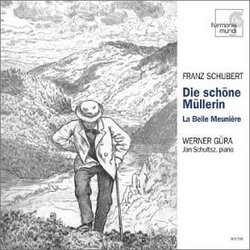| All Artists: Franz Schubert, Werner Gura, Jan Schultsz Title: Schubert - Die Schone Mullerin Members Wishing: 0 Total Copies: 0 Label: Harmonia Mundi Fr. Release Date: 10/10/2000 Album Type: Import Genres: Pop, Classical Styles: Vocal Pop, Opera & Classical Vocal Number of Discs: 1 SwapaCD Credits: 1 UPC: 794881611423 |
Search - Franz Schubert, Werner Gura, Jan Schultsz :: Schubert - Die Schone Mullerin
 | Franz Schubert, Werner Gura, Jan Schultsz Schubert - Die Schone Mullerin Genres: Pop, Classical
|
Larger Image |
CD Details |
CD ReviewsAn outstanding perfomance Gregory Homan | Anytown, USA | 03/28/2001 (4 out of 5 stars) "This is an outstanding reading. Gura's voice is strong and his sound very attractive, and I find the accompaniments very well realized by Jan Schultsz. The interpretation is assertive and Gura permits himself considerable variation in tempo, particularly in the strophic songs. Some may feel that these are relatively unnuanced performances, and the dependence on tempo changes for expression unsubtle, but I think Gura's approach works, especially in the earlier songs where Gura makes Ian Bostridge, on the widely praised Hyperion disc sound almost casual. Gura's evident intent to characterize each verse results in a wonderful rendition of "Tranenregen". He also finds wonderfull variety in "Pause" and the agitation and anger in "Der Jager" and "Effersucht und Stolz" are exceptionally well realized, surpassing here even Fischer-Dieskau's EMI performance. This really could have been a landmark performance, but Gura does not quite plumb the depths of sorrow at the end. This is where Bostridge really comes into his own and I found "Trockne Blume" and "Der Baches Weigenlied" a little disappointing, both compared to Bostridge or the Gura's accomplishment in the earlier songs. I think if a prospective buyer wanted only one Die Schone Mullerin I would suggest Fischer-Dieskau, probably the DGG (no one ever got fired for recommending Fischer-Dieskau, after all), but for those looking for additional recordings, and those interested specifically in a tenor reading this performance should be considered." A Lovely Die Schone Mullerin Robin Friedman | Washington, D.C. United States | 08/27/2007 (4 out of 5 stars) "Franz Schubert (1797 -1828) composed two song-cycles both set to the poetry of William Muller (1794 -- 1827). The first of these cycles, "The Miller's Lovely Daughter" dates from 1823 while its companion, "Die Winterreise" was composed near the end of Schubert's life in 1827-1828. Baritone Dietrich Fischer-Dieskau has made outstanding recordings of both these works, but the beauty of this music is inexhaustible by any one performer. "Die Schone Mullerin" in particular is often sung by a tenor, and my treasured version is by Fritz Wunderlich and Hubert Giesen. In this relatively recent version of "Die Schone Mullerin" tenor Werner Gura is accompanied by Jan Schultsz. Gura has made several recordings of Bach cantatas and is a noted opera singer for the Semperoper in Dresden. Schultsz is known both as a rising conductor and as a pianist.
The performance brought lightness and life to my heart when I heard and reheard it over the course of a dreary several days. Gura sings with a full, expressive tenor and makes the most of the changing moods of Schubert's music and Muller's text. Schultsz' performs, as the music requires, as an equal party to the singer. His Bechstein piano is ringing and lyrical and he makes the most of Schubert's frequent word-painting. "Die Schone Mullerin" consists of 20 short poems. It is a much more lyrical cycle than "Die Winterreise" and, for that reason, is probably more accessible to the listener new to German lieder. The work tells the story of a wandering young man who sees a lovely girl, the daughter of a miller. He takes a job at the mill and attempts to win her heart. Although he is initially successful, he loses the girl to another and is inconsolate with grief. At the end of the cycle, he commits suicide by drowning himself. Jura and Schultsz capture the emotions of the music well, especially in the earlier parts. I wanted to join Jura in singing the irresistable melodies. Schultsz provides especially effective, upbeat accompaniment in the opening song, "Das Wandern." Jura captures the ambiguous feelings and moods of the sixth song "Der Neugierige", and both vocalist and pianist rise to the climactic pivotal work of the collection "Mein!", placed at the mid-point. In the latter part of the work, the erie dialogue of "Der Muller und der Buch" is deeply impressive, and the final number, "Des Baches Wiegenlied" only slightly less so. For all the ultimate sadness of the story, this music leaves me with the feeling of song and romance. Gura and Schultsz offer an excellent reading of this music which will probably have the greatest appeal to those listeners who have some familiarity with the work through recordings of Fischer-Dieskau or others. The CD includes good liner notes by Roman Hinke and the German text of the songs but no translation. Robin Friedman" |

 Track Listings (20) - Disc #1
Track Listings (20) - Disc #1